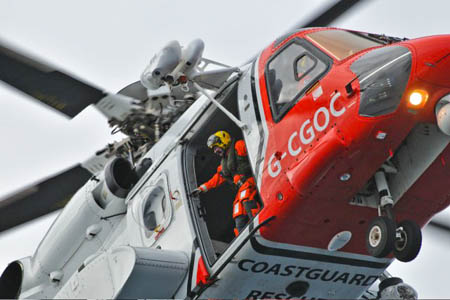The Government has pledged to keep search and rescue helicopters flying as a Coastguard contract nears its end.
The crews and craft of the Coastguard, RAF and Royal Navy are often requested by Britain’s civilian volunteer mountain rescue teams when rapid searches and evacuations of casualties are needed on the country’s hills.
All Britain’s search and rescue helicopters were due to be privatised under a scheme agreed by the previous Labour Government, but irregularities were found in the bidding process in February and the project was scrapped.
The cancellation of the contract left the ageing military Sea Kings facing extended service and the Coastguard arrangements uncertain as the Maritime and Coastguard Agency provision with private company CHC is due to end next year.
This week, Transport Secretary Philip Hammond told the House of Commons a new, short-term tendering process would be put in place to ensure the Coastguard provision, vital to walkers and climbers in the North and West of Scotland, can continue.
Mr Hammond said: “As the existing Maritime and Coastguard Agency search and rescue helicopter contract that provides service at Portland, Lee on Solent, Shetland and the Isle of Lewis is set to expire, I wish to inform the House of my plans to ensure that search and rescue helicopter services from these locations continue uninterrupted until new long term arrangements are in place.
“To ensure the continuity of services from these locations, the Department for Transport will shortly run a competition to procure an interim service for a period of up to five years.
“This contract will be similar to the arrangements that are currently in place for these bases and are working well. The contract will be open to all interested bidders able to offer a service that fully meets our requirements and ensures the safety of the public and seafarers.”
He added: “The Royal Air Force and Royal Navy will continue to provide coverage from their search and rescue bases as at present, while I consider the options for the long term provision of search and rescue helicopter capability.”
Mr Hammond said the intention was for military Sea Kings to be withdrawn from service in 2016.
The announcement came in the same week as a Government u-turn on plans to close 10 Coastguard maritime rescue control centres around the country.
Transport Secretary Philip Hammond announced the change in plans following a large number of representations from worried members of the public and organisations.
The coalition Government originally proposed cutting the number of Coastguard control centres from 19 to nine, with only three remaining open 24 hours a day. But yesterday, Mr Hammond said 11 centres would remain open, all operating round the clock.
The centres deal with maritime incident co-ordination. The Coastguard search and rescue helicopters, though based at MCA centres, are controlled separately in response to the Air Rescue Co-ordination Centre at RAF Kinloss in Moray.
He said: “We have been clear that modernisation is required to deliver a resilient Coastguard service, fit for the 21st century.
“But we have always been open to debate about how that should be achieved. This has been a genuine consultation that has seen a high level of engagement and many well-thought out responses, including specific alternative proposals.
“It is clear from the responses that there is huge public and political admiration for the work of our Coastguard, a clear consensus that change and modernisation is necessary, but also some specific concerns about the original proposals.”
Under the new proposals the Coastguard stations at Clyde, Forth, Portland, Liverpool, Yarmouth, Brixham, Thames and Swansea will all close progressively over a three-year period starting in 2012. The station at Solent will be replaced by a new national Maritime Operations Centre in the Portsmouth and Southampton area.
The Public and Commercial Services Union, which represents many Coastguard staff, said it welcomed the partial climbdown on closures, but said it will still oppose any new plans that would result in safety being compromised.
“The rethink means some of the stations previously threatened with closure will be saved, and all those remaining will stay open 24 hours. This recognises the need for round-the-clock coverage to preserve the vital local knowledge that the Government initially claimed would not be lost, but which was proved wrong.
“Today’s announcement is a partial victory for the communities who campaigned to save what is an essential public service that they hold dear. But it will be a bitter blow for those still under threat.”
PCS general secretary Mark Serwotka said: “We pay tribute to our Coastguard members and people in their communities who have fought so hard to defend what is a vital public service.
“This fight is not over. We are committed to ensuring we retain the local knowledge of our coastlines that is essential to saving lives, as we are determined to defend all public services and our communities from the Government’s cuts.”
The new Department for Transport proposals will now be subject to a further 12-week consultation period, which will run for twelve weeks ending on 6 October.
- grough originally reported that the maritime rescue control centre closure proposals would have an effect on Coastguard search and rescue helicopters. We now accept this is not the case.
